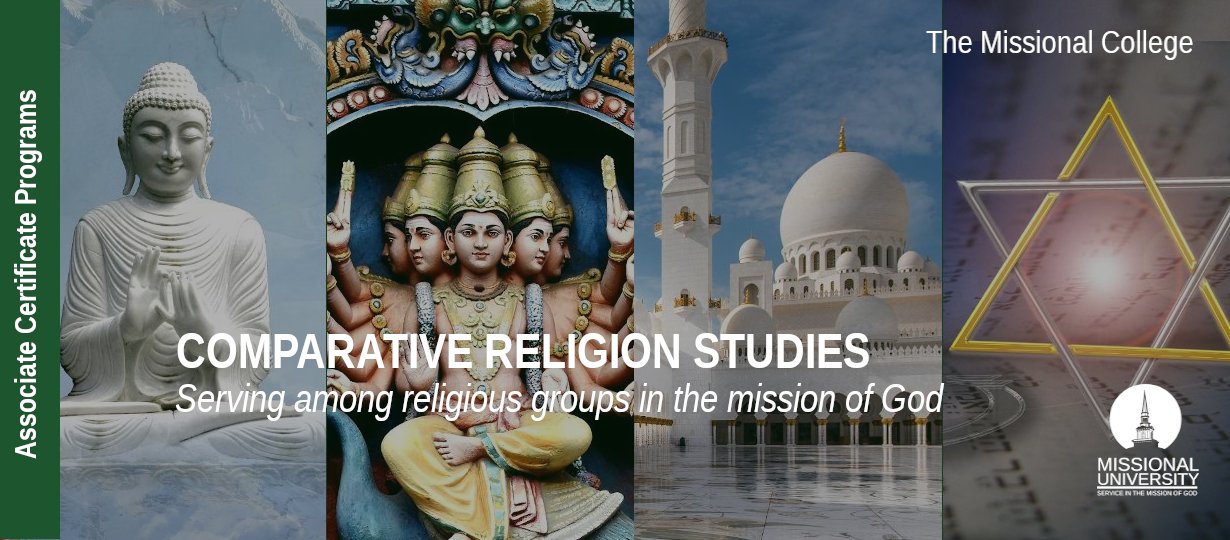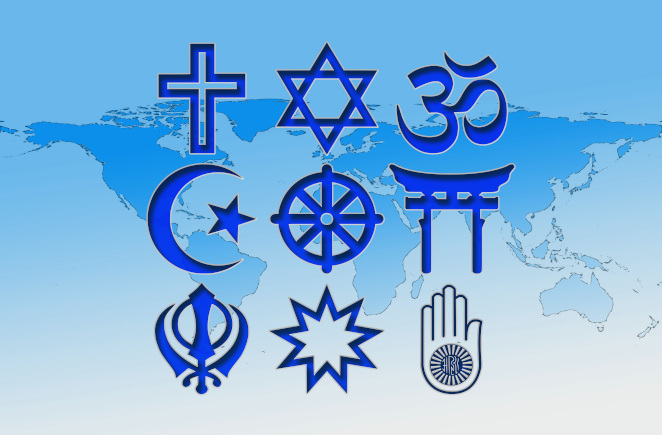
Online Associate Certificate Program in
Comparative Religion Studies
School: Missional College // Study Area: Serving Among Religious Groups
⚜ Rarely Offered in Christian Universities, Bible Colleges or Seminaries
Expand Your Intercultural Abilities Today!
REQUEST INFORMATION
Ready to learn more about the
Associate Certificate in
Comparative Religion Studies?
LEARN MORE NOW
The Associate Certificate in Comparative Religion Studies
Program Features
-
Integrated practicums allow you to gain valuable real-world experience
-
Learn from academic practitioners from around the world
-
Credits earned in this certificate program can apply to a Missional University Associate program
Course Effort
Course Length
Credits Required
Program Cost
What Will I Study?
We offer the most comprehensive approach to serving interculturally in the mission of God.
A survey of Missio Dei, the Mission of God, explores Salvation History through the redemptive vision of God. The student will learn how God is reconciling all of creation unto himself in the person and work of Jesus Christ. Students will also observe God at work through His people in mission.
This course explores the spiritual dimension of missional engagement in the post-Christendom world. Students will discover practical and creative ways of deepening their personal spirituality allowing more engagement with not-yet Christians and the development of authentic missional community. Resources will include readings, video interviews with practitioners, creative spiritual practices, real-life experimentation and weekly Q & A reports.
Exploration of an approach to worldview study and a dialogical method to sharing your faith at a personal level, beginning with a clear understanding of Christian mission. Considers how understanding another person’s worldview through asking excellent questions will lead to a variety of approaches to evangelism in the context of diverse 21st century cultures.
Introduction to the social scientific and historical comparative study of religions. Through reading, reflection, writing and discussion, students will explore the social and personal dimensions of religion through history, how religion shapes people and their experience of the world, and how it is shaped by people. Students will develop their own unique “Great Commission” and missional-relational perspective.
Survey of major religions, from ancient foundations through current practices. Using films to illustrate lifestyle, culture and context, students explore Hinduism, Buddhism, Judaism, Islam and Christianity, as well as some less widespread historic and newer religions. Addresses divisions within a religion, how new religions emerge, tribal practices and atheism.
Choose one below
Introduction to religious beliefs and practices across cultures. It surveys major religions of the world and examines forms of religious beliefs; a variety of gods and supernatural forces; use of myths, rituals, religious ceremonies; shamans, priests, and religious specialists.
Traces the history of the Jewish religion and the communities that preserve its traditions, from its origins in ancient Israel to the present day. Consideration will be given to Judaism’s major ideas and practices as well as the diversity of Jewish cultures throughout the world. We will explore a range of classical and contemporary Jewish approaches to Biblical interpretation, theology and views of God’s nature, ethics, ritual and spirituality, and relations with Christians.
Introduction to Hinduism, exploring the history, scriptures and important religious movements of India. Consideration will be given to the Christian/Hindu interaction both historically and in the modern period. The state of missions to India and contemporary Hindu political movements will also be discussed.
Introduction to some of the new religious movements in both Eastern and Western societies. The course examines their origins, basic beliefs and practices. Special attention is given to the differing concepts of the divine, views of human nature, understandings of death and the afterlife, and of how we can live flourishing lives in the present
Overview of the Buddhist religious tradition, covering the life of the Buddha, the origins of Buddhism in India, the development of major doctrines and institutions, the nature and practice of meditation, the tradition’s growth and spread throughout Asia, as well as contemporary expressions of Buddhism
When Can I Get Started?
We offer multiple start dates each year to give you flexibility in your education, life and work schedules.
JANUARY
MARCH
MAY
AUGUST
OCTOBER
A Career in Navigating Cultural Difference
Is this Your Mission?
Missionary, Religious Leader, Community Worker, International Worker, Humanitarian Worker, Missional Team Leader, Global Director, Faith and Development Manager, Marketplace Ministry Worker, Children's and Youth Worker, Researcher
Request Information Now
How Much Will it Cost?
We offer tuition based upon country of residence. According to the Human Development Index, all countries around the world fall into one of four categories:
-
(Tier 1) - Very High Human Development
-
(Tier 2) High Human Development
-
(Tier 3) Medium Human Development
-
(Tier 4) Low Human Development
Our tiered global tuition makes higher education affordable for everyone world wide.

TIER COUNTRIES
100% Tuition
$295
per credit hour
3 credit course
$885

TIER COUNTRIES
80% Tuition
$236
per credit hour
3 credit course
$708

TIER COUNTRIES
60% Tuition
$177
per credit hour
3 credit course
$531

TIER COUNTRIES
40% Tuition
$118
per credit hour
3 credit course
$354
Tiered tuition based on country of origin and scholarships available. Find your country of residence here for more information.
Tuition may be further reduced by participating in the Sponsorship Program.
